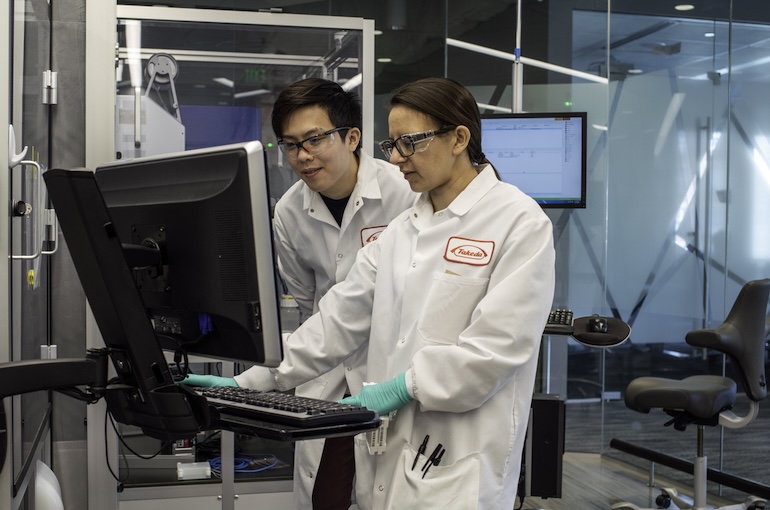 China to Equal Boston in Biotech in Next Five Years, Takeda's R&D Chief Predicts
China to Equal Boston in Biotech in Next Five Years, Takeda's R&D Chief Predicts(Yicai) Sept. 19 -- The Chinese biotechnology industry is expected to reach the same level as Boston's in the next five years, according to the president of research and development at Japanese drugs giant Takeda Pharmaceuticals.
"At some point, people came to Boston to understand how innovation happened in Boston, and there have been books written about Boston,” Andy Plump told Yicai in a recent interview in Shanghai. "China would be like that in the next five years.”
Bolstered by world-class centers of learning such as Harvard University and the Massachusetts Institute of Technology, Boston is the world’s premier biotech hub. More than 106,000 people worked in the biopharmaceutical sector in the US state of Massachusetts in 2022, keeping a steady, bench-to-bedside pipeline of drugs flowing.
China, which is Tokyo-based Takeda’s third-largest market, is rapidly becoming a global innovation engine, powered by what Plump calls a “remarkable ecosystem” that combines engineering capability, speed, and creativity.
“China has infrastructure capability in talent that allowed it to do things at a cost and quality that are unique across the world," Plump said, pointing to the country’s rapid project execution and talented workforce. The world’s second-largest economy is moving at a speed that is "refining" the industry, he added.
Plump highlighted a clear shift in China’s biotech landscape from producing “me-too drugs” to delivering original, high-value "me-innovation drugs,” fueled by world-class science, strong academic institutions, and fast drug discovery timelines. “China is already leading in scientific literature like Science, Nature, and Cell," he noted, refuting claims that China lacks originality.
Three factors set China apart, Plump said: top-tier science, entrepreneurial management, and enabling infrastructure, including government and regulatory backing.
The ecosystem that has formed in China with the combination of the above three factors can be called a “closed-loop innovation system," said Wang Lin, Takeda's R&D head for China and Asia Pacific. “We see the innovators work closely with physicians. The physicians identify new targets for certain diseases, and immediately feedback to the researchers,” he said. “This loop is really close and very quick."
"Japan has great science, regulatory framework that's very permissive, and the government is very supportive. But they lack that entrepreneurial community," Plump explained. Similarly, "Singapore for many years has tried to do what's happening now in Boston, what's happening now in China. But Singapore doesn't have the same academic history and academic excellence that China has."
"All three are really critical, and you have that integration here in China." added Plump.
Takeda China: From Follower to Global Driver
Takeda's R&D strategy in China has shifted, moving to a "China for Global" approach from a "Global for China" stance, leveraging the country's vast patient population and unmet medical needs, according to Plump.
The evolution began with a “China catch-up” phase that focused on bringing Takeda’s existing innovative portfolio, including treatments for rare diseases, to Chinese patients, Wang said. Regulatory reforms around 2015 to 2016 then enabled simultaneous global development and filings, he added.
Takeda was one of the first to file in China just two months after making a submission in the United States, “setting a record at the time," Wang noted.
The company sees enormous potential in China, which has a vast patient population with high unmet medical needs that can accelerate global drug development, he added. That momentum is reinforced by supportive policies, including a 30-day Investigational New Drug approval pathway and fast-track designations for breakthrough therapies.
In March, Takeda Chief Executive Christophe Weber announced that the company had approved more new products in China over the past five years than in the previous 25 years, surpassing its goal of launching 15.
Strategic Partnerships, AI Applications
The pharmaceutical industry contends with steep development costs and pricing pressure. “How do we truly unravel our understanding of human disease, and make molecules that can treat disease? That's the biggest challenge we face," said Plump.
Drug development is costly and risky, often requiring USD1 billion to USD2 billion and 10 to 15 years per approved drug, with overall failure rates in excess of 90 percent, studies show. That places immense strain on R&D budgets and commercial models.
Global healthcare shifts and pricing pressures are compounding the challenges, said Plump, citing changes in the reimbursement system and patient access.
To address these issues, Takeda has streamlined its R&D efforts by prioritizing high-potential programs, and thereby reduced costs by nearly 15 percent to JPY143.9 billion (USD979 million) in the quarter ended June 30 from a year earlier.
"We now have six programs in Phase III across multiple indications," Plump said, adding that results are expected this year for three of them and within the next three years for the others.
Takeda relies heavily on partnerships, having over 130 ongoing collaborations. Forty percent of its portfolio comes from working with partners.
In China, Takeda joined hands with the Atlatl Center for Innovation and Research, combining its expertise with local technology for molecular profiling and broader academic collaboration.
The partnership with Chinese innovative drugmaker Hutchmed exemplifies success, with sales of jointly developed drugs three to five times higher than expected in the first two years.
Artificial intelligence is central to Takeda's strategy. "In the next one to three years, 100 percent of our programs will be enabled by digital and AI," Plump said. Investment in data technology now outpaces R&D, reflecting a multi-billion-dollar shift. “Either you use it -- you will be proficient, and it will be a competitive advantage -- or you won't exist," Plump warned.
Editor: Futura Costaglione